Toto Wolff on taking F1 into the mainstream ahead of the Australian Grand Prix
The Mercedes team principal has seen Formula One evolve from closed-book sport to worldwide phenomenon, as Toto Wolff explains as he gears up for Sunday’s Australian Grand Prix.

I’m not a morning person. I actually hate mornings,” says Toto Wolff, acknowledging it’s dawn in Australia. “Friday, I woke up with my wife and six-year-old at 6.50am. It bothers me. There’s nothing to do at that time of the day. Nobody’s working. I can’t call anyone, nor do I get a message quickly. I had one of our drivers, George, travelling with me to the UK and he said, ‘I really love these early mornings.’ I said, ‘For me, it’s the opposite.’”
It isn’t early for Wolff though. In fact, it’s late, nearing 8pm where he is, an hour or so outside of London. But it’s no surprise that the unproductivity of an early morning isn’t up Wolff’s alley.
Wolff – team principal, CEO and part-owner of Mercedes-AMG Petronas Formula One team – lives his life to a stopwatch, meticulous and economical. “It sounds a bit boring, but I need to shake off all possible distractions,” Wolff, 52, says over Zoom. His typical routine for Grand Prix weekends sounds ritualistic and positively distraction free. “The journey is: landing, going into a hotel and being in the same room that I’ve been the year before. I have the same driver who gets me to the circuit. Our office, the people, sessions at the same time. I eat the same thing for breakfast, lunch and dinner to make sure that I’m not upsetting myself. I have the same sleeping regimen.”
Even Wolff’s wardrobe is clockwork. “The things I wear are from a Viennese tailor. They do everything there from the socks, to the shirts, to the trousers. They’re all the same cut. I choose which buttons I need, and where.” He holds the cuffs of his shirt up to the camera to display the pearly white buttons on his dress shirt. “I have this shoemaker, third generation in Vienna. They never change because it’s easy to decide in the morning.”
Maybe it’s a sense of Austrian orderliness – Wolff was born and raised in Vienna – or perhaps it’s a mirror to the rhythmic precision of the race cars he manages, but Wolff has clearly found magic in the rigmarole.
At Mercedes, he has seen the team to eight consecutive championships as team principal (the position a combination of a coach and a manager). That said, he won’t take too much of the credit. As he explains, “Formula One is about physics. There are no mystics. It is about analysing last year’s data and trying to come to a conclusion that makes sense. In a way, you need to learn the lessons from the previous seasons – and we had some tough lessons to get over – and without carrying too much negativity in the following season.” (After its eight championships between 2014 and 2021, Mercedes hit a slump and hasn’t won a race since November 2022, giving way to the currently
dominant Red Bull.)
There’s a reverence in the way Wolff talks about the physics of Formula One. Other sports may rely on natural athleticism or elemental conditions, but in F1, all the teams pray at the altar of the car. Teams employ hundreds of crew members, from astrophysicists to thermodynamic engineers, who work together to produce a singular piece of machinery, designed to bend the laws of physics in hot pursuit of glory, racing to speeds of 350 kilometres in rain, hail or shine.
This year’s newly released W15 looks to be the goods. A good driver is important, too, Wolff concedes. “The quickest driving with the quickest car, [that’s] the winning package.”
Many could argue it’s that rigid technicality that has been gatekeeper of the sport, shielding it from the rest of the world since 1950. That is, until Drive to Survive came along.
In 2019, Netflix released the first season of the documentary-style series about F1, taking the if-you-know-you-know sport hurtling into the mainstream. What was once a
closed-door sport suddenly became the obsession of every red-blooded gen Z and millennial, the drivers and team principals of F1 becoming main characters in the thrilling, bitchy drama of it all, the spats between teams playing out like a Real Housewives episode exploded inside a NASA lab.
Wolff had been operating in the net of relative anonymity his entire career, as a former racer and businessman, before Drive to Survive took off. (Now, TikTok is filled with slow-mo videos of him set to pitched-down edits of “I Wanna Be Yours” by the Arctic Monkeys). But he doesn’t mind the newfound fame it has brought, if the trade-off is the exposure and new fans. “If [it] means we have such global recognition, that means the sport is in a good place. I take it any day of the week to maybe have a little bit less anonymity for the benefit of the team and the sport.”
The benefits need no introduction. Wolff concedes F1 had been “a white middle-aged man’s sport” for too long, but now, “our strongest-growing audience at the moment is young females, and younger audiences in general”. And this younger generation is startlingly tapped in. As Wolff puts it, “They know the ins and outs. They get up early, or stay up late, in order to watch the Grand Prix. I hear often, ‘When are you signing the contract with Lewis? What are you doing about next week’s race?’ And I’m like, ‘How do you know about that?’”
The Lewis in question is, of course, Lewis Hamilton. Days after this interview was conducted, news broke that Hamilton had split with Mercedes after 11 years to sign with rival Ferrari, beginning in 2025. In collaboration with Wolff, Hamilton won an unprecedented seven world championships, the equal-most of any driver in history.

But on-track success, and there’s been plenty of it, is one thing. It’s clear from the way Wolff talks about Hamilton, it’s also his impact off-track that made him a legend. Hamilton – the first and only Black driver in the competition – has been the target of racist attacks and allegedly unfair rulings throughout the entirety of his career. Wolff’s comments about F1 historically being a “white man’s sport” are not unfounded. Wolff tells me his journey with Lewis opened his eyes to “the obvious, the direct and the unconscious discrimination” he has faced. “He said to me, ‘Have you ever thought about your skin colour?” The answer is, ‘I haven’t.’ He said, ‘When you walk into the paddock, how would you feel that if you’re the only white guy, everybody else is Black? Well, that’s [been] happening to me since forever.’”
Wolff continues: “I’m trying to give that message to the people that listen to me and say, ‘We have a young man that has seen all of that abuse in his childhood years, going through karting and the senior seats, and the only thing he could do is perform on track and show everybody else that they’re wrong.’ And that’s why we, as a global sport with a billion-and-a-half audience, need to be trailblazers. Trailblazers for more diversity, more inclusion, and equality in the sport.”
This article appeared in the March issue of Vogue Australia, on sale now.




